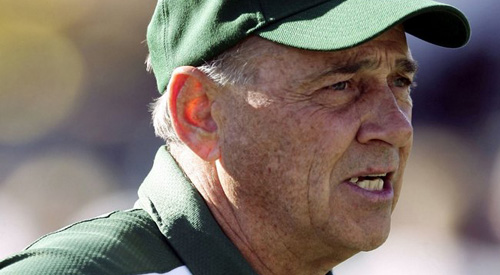
Arkansas’ transition shows winning isn’t everything
Quick: a college football team fires a coach with a 75-26 overall record and a .742 winning percentage, including 10- and 11-win campaigns in the last two years, and replaces him with a man who’s 132–86 overall (a .601 winning percentage), hasn’t coached a game in a head job since 2006 and went 22-26 overall in his penultimate head-coaching gig (before his most recent one, where he didn’t even coach a game). Did they make the right move? From many quarters, the answer would generally be a resounding “No!”; winning at the top levels is so critical that numerous people would list it as the most important qualification for a coach. When you throw in the specific circumstances surrounding the University of Arkansas Razorbacks’ decision to go from Bobby Petrino to John L. Smith this spring, though, it’s easy to see why athletic director Jeff Long is winning plenty of praise for the move. The Petrino situation is proof that Henry Russell Sanders’s famous quote isn’t universally applicable; sometimes, in fact, winning is not the only thing.
What led to Petrino’s demise, of course, was the relationship he had with 25-year-old former Arkansas volleyball player Jessica Dorrell, which was exposed after police reports revealed her as the passenger when Petrino crashed his motorcycle in early April. By itself, that’s not particularly admirable, but it’s also not something that would cause many coaches to lose their job. After all, look at Louisville basketball coach Rick Pitino’s sordid story of restaurant sex and extortion, which came out in 2010; Pitino’s done just fine since then, leading the Cardinals to this year’s Final Four, and few even bring that up any more. The idea of college coaches as role models for young athletes is a nice one, but time after time, it often doesn’t live up to the facts; if you win, you can often get away with a lot. Heck, Petrino’s Arkansas tenure itself exemplified that; he infamously walked out on the NFL’s Atlanta Falcons for the Razorbacks’ job before Atlanta’s 2007 season ended, and although he was widely condemned at the time, that story soon was forgotten about when the Razorbacks started winning.
[php snippet=1]
This particular situation wasn’t just about a coach being sleazy, though, and that’s what led to Petrino’s demise. The crucial part of the story is that Dorrell wasn’t just the young woman Petrino was cheating on his wife with; she also happened to be an employee of his, the student-athlete development coordinator he hired from amongst 159 candidates after already beginning an affair with her. Add in that Petrino reportedly lied repeatedly to Long about his relationship with Dorrell, and you start to see why Arkansas would cast aside such a successful coach. As Long said in his statement about Petrino’s firing for cause, the crucial issue wasn’t Petrino’s infidelity, but rather his abuse of power in hiring Dorrell and his unwillingness to be truthful with his superiors after the accident:
“In short, coach Petrino engaged in a pattern of misleading and manipulative behavior designed to deceive me and members of the athletic staff both before and after the motorcycle accident. He used athletic department funds to hire for his staff a person with whom he had had an inappropriate relationship. He engaged in reckless and unacceptable behavior that put his relationship in the national spotlight.”
…”Coach Petrino knowingly misled the athletics department and the circumstances related to his accident,” Long said. “He had multiple opportunities over a four-day period to be forthcoming with me. He chose not to. He treated the news media and the general public in a similar manner.
That’s really the key here. This decision isn’t saying that college coaches all have to be moral, upstanding role models, and that’s probably a good thing, as they’re unlikely to be perfect on that score any time soon. The issue is with coaches who take their power as an excuse to run roughshod over everyone in their way, and Petrino’s behavior throughout the Dorrell situation suggests he was thoroughly out of control. With that in mind, Long was quite right to fire him, and he’s deservedly earned plenty of financial support from donors for taking a strong stance on this.
What’s interesting about the move to Smith is that it suggests Arkansas is still very focused on winning this year. Sure, Smith’s qualifications aren’t ideal, especially considering that he hasn’t coached a game as the man in charge since 2006; he went from working as a linebackers coach at Arkansas to the head-coaching job at Weber State before taking this job, but never coached a game with the Wildcats. His familiarity with the team and previous head-coaching experience likely makes him the best candidate Arkansas could nab at the moment, and the success he had with Idaho and Louisville suggests he may be able to work with the strong core of players Petrino left and keep Arkansas in contention for the SEC title and perhaps more this coming season. Moreover, he’s only on a 10-month contract, so if it doesn’t pan out, the Razorbacks won’t be in a financial hole. This is still a team that wants to go for it this year despite Petrino’s firing, though, and if Smith can do a promising job with them, the head gig may be his to keep. He’d do well to learn from Petrino’s downfall, though; winning is a critically important thing, but it’s not the only thing.
[php snippet=1]

